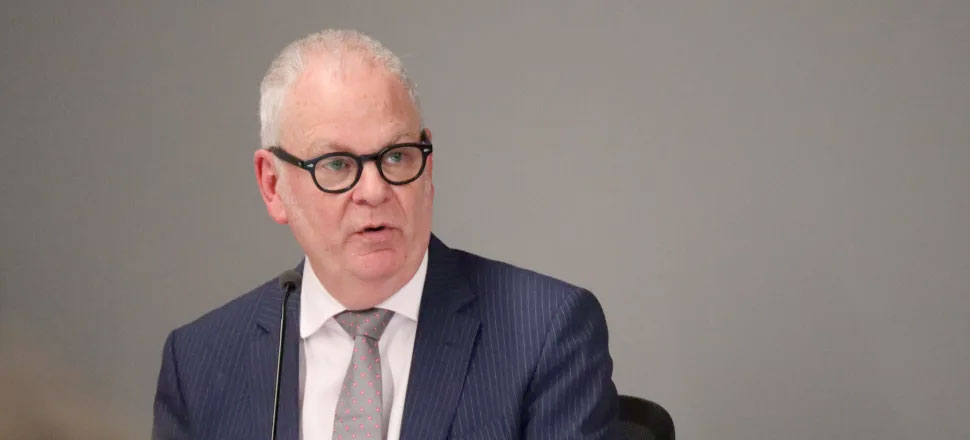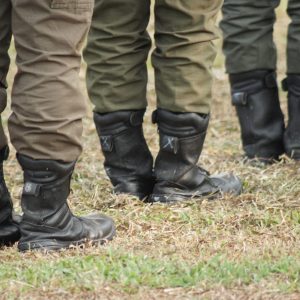Head of the public service says agencies will own, fix and learn from failures. David Williams reports.

Photo: Abuse in Care Royal Commission
After his general “acknowledgements”, including saluting the courage of abuse survivors, Peter Hughes spoke of his former role as boss of the Ministry of Social Development.
Hughes, Public Service Commissioner, was appearing before the Abuse in Care Royal Commission at a hearing in Auckland, four-and-a-half years after the inquiry was announced.
Much water has passed under the bridge, and the commission had already made findings on the testimony of survivors and witnesses.
“I want to acknowledge that the ministry, in my time, did not always get things right,” said Hughes, MSD’s boss between 2001 and 2011. “I want to specifically acknowledge the evidence of survivors from the state care and protection system about their experiences of redress.”
Helpfully, the commission’s interim report, He Purapura Ora, he Māra Tipu – From Redress to Puretumu Torowhānui, made public in December last year, contains case studies of survivors’ experiences with MSD.
Des Hurring, of Ngāi Tahu, Tasmanian Aboriginal and British descent, suffered physical and sexual abuse at Lookout Boys’ Home in Dunedin, and Levin’s Kohitere Boys’ Training Centre.
He filed a High Court claim against MSD in 2006. The following year, Crown Law suggested he drop the claim because of significant legal hurdles, but Herring refused.
In 2008, the High Court refused to hear the case, citing an inadequate explanation for the delay in bringing his claim. He entered the ministry’s out-of-court claim process, but it took more than a year for copies of his records to be handed over.
In 2016, Herring accepted a $12,000 payment through a “fast-track”.
“I feel like the money I got from MSD is ‘dirty money’, mainly because MSD has never shown any real remorse or given me a proper apology or acknowledgement for the abuse and harm I suffered.”
The report said survivors’ experiences were downplayed, disbelieved or dismissed, and only a determined few struggled on through courts, where they met legal brick walls.
Agencies, including MSD, lost sight of the people behind the claims, and the horrific abuse they suffered.
The Crown promised to be a model litigant.
Hughes, as head of MSD, made such an assurance to survivor Keith Wiffin, who filed a claim in the High Court in 2006. The Royal Commission found some straightforward steps would have determined Wiffin’s claims, including being repeatedly sexually abused, were credible, and involved a convicted child-sex offender.
But rather than settle, as they should have, MSD and Crown Law decided to fight.
The interim report outlines how agencies adopted a win at all costs attitude, using aggressive tactics and hiding behind technical defences. After years of fighting, survivors were often presented with a take-it-or-leave-it offer.
The Crown’s offer to Wiffin, in 2009, was to pay for up to $4000 of counselling. “It was, in substance, no offer at all,” the Royal Commission report said.
Back to today’s hearing, and Hughes, now the Public Services Commissioner.
“What happened to those who were abused in care, should not have happened,” Hughes said in his introductory statement. “And I deeply regret that it did.
“I also acknowledge that in attempting to assess and settle those claims, we did not get everything right.”
That is somewhat of an understatement.
My colleague Aaron Smale’s reporting has detailed how, while Hughes was head of MSD, private investigators were used to “try to dig dirt on victims and witnesses in a test case on state abuse that went to court”.
It was known as the White case, involving a pair of brothers, known as Paul and Earl White (not their real names). Wiffin maintains, as part of the White case, he was being watched by private investigators.
The Royal Commission details how the brothers were cross-examined like criminal defendants, and how the Crown sought $33,000 in costs from Paul.
In 2016, MSD denied using private investigators to find information about claimants and witnesses. Ironically, or appropriately, it was a State Services Commission inquiry which revealed MSD spent $90,000 on private investigators. The head of State Services at the time was Peter Hughes.
Hughes said today: “What happened to Mr Wiffin, Mr Paul White and Mr Earl White, should not have happened. I apologised to each of them at the time for the failure of the state to protect them from abuse while in care, and for the further harm the Ministry of Social Development caused them in managing their claims. I repeat those apologies today.
“In addition, I sincerely and unreservedly apologise for the other failings identified subsequently by the commission in its redress report.”
Those general and specific “acknowledgements” took Hughes a touch over five minutes.
Before making his opening remarks, Hughes was prompted to correct his written statement. It turns out he’d neglected to list the Ministry for Pacific Peoples and the Education Review Office as being members of an inter-agency group working on the Crown’s response to the inquiry.
This time, when it came to a government agency, he was quick to say sorry. “I apologised to both agencies.”
An hour into Hughes’ time in the witness box, commission lawyer Anne Toohey referred to the commission’s redress report, and how lawyer Sonja Cooper, who acted for many survivors, reported to MSD allegations related to various children’s homes.
Toohey asked if Hughes did anything to establish the extent of abuse.
“I’m not sure how we would have done that,” he responded, while admitting he shared Cooper’s numbers with government ministers at the time.
“The scale of abuse was simply too horrific too acknowledge,” the Royal Commission said in its interim report.
Noting his earlier apology to the White brothers, Toohey set out criticism by the Royal Commission of the Crown and MSD, including that it “instructed private investigators to seek personal information about the White brothers and other survivor witnesses in an overly broad way, which did not rule out surveillance”.
The 2018 inquiry by the Peter Hughes-led State Services found MSD, formerly led by Peter Hughes, breached its code of conduct when using private investigators, “at a lower level than Crown Law”.
Toohey asked: “Did you know about that, Mr Hughes, the use of surveillance when you were at MSD?”
He responded: “I cannot recall that at all.”
He did recall once authorising the use of surveillance to find the “perpetrator” in a multi-million-dollar benefit fraud. The decision rights were shifted “because I did not like the practice”.
“So, no, I have no recollection of that whatsoever. That case would have been well in litigation at that point.”
He went on: “But I have to accept the fact that it has been found MSD staff did, and did not push back on the proposal to use those investigators. I was the chief executive, I have to accept that.”
Toohey moved to the Royal Commission’s criticisms of Crown Law and MSD over Wiffin’s claim. On the livestream, Wiffin could be seen in the public gallery, over Toohey’s shoulder.
Considering he had already apologised, Toohey asked Hughes to comment on the “overall picture”, and the way the state responded to the claims.
“It suggests that, at the time the Crown was litigating, it was responding to protect the state against litigation rather than looking to actually respond to its failings in safeguarding children against abuse in care. Is that a fair comment, Mr Hughes?”
Hughes said when he became MSD’s chief executive he didn’t like the way its lawyers were doing their job – he called it “corporate lawyering” – noting the power imbalance between the state and the vulnerable people taking those claims.
“I said I wanted a client-centred and principles-based approach. I didn’t like, for example, that we were using limitation approaches.”
The record shows despite his distaste, the strategy didn’t change.
Hughes says the agencies were “bound up” by the Crown litigations strategy – although that’s hard to reconcile, as, in several cases, including Wiffin’s, the Crown didn’t follow that strategy, which was to settle meritorious claims.
There were multiple agencies involved in the litigation process, he noted.
In a stunning admission of supposed powerlessness by a chief executive, Hughes said: “In retrospect, I think I was naïve about my ability to effect change rapidly to all of that.
“And I have to accept that MSD staff contributed to all of these things.”
Hughes’ appearance sits in the context of a fortnight punctuated by institutional deflections, and insulting insensitivity.
For the past fortnight, the Abuse in Care Royal Commission has heard from key agencies, such as the Ministry of Social Development (the old Department of Social Welfare), Police, the Ministries of Health, and Education, and the Oranga Tamariki, the Ministry for Children.
Wiffin said the ministry’s officials seemed like a “totally unfeeling, unempathetic group”.
There has been lots of “acknowledgement” and very little “apology”.
Police Commissioner Andrew Coster talked of survivors getting “inadequate service”, while Ministry of Health officials talked of “errors of the past”.
Earlier this week, Oranga Tamariki’s chief executive, Chappie Te Kani, avoided acknowledging abuse as systemic.
No wonder survivors felt insulted, given many were ripped from their whānau, their culture, their language and identity, only to be abused and tortured, their lives ruined within the very institutions that were meant to be caring for them.
Instead, a major percentage of them went through the welfare system and into the country’s jails.
Widespread abuse has no doubt led to a huge distrust of authority, and the decades-long tragedy, perpetuated and sometimes defended by state agencies, has been called, by Wiffin, a dereliction of duty, and a betrayal of survivors and the whole country.
Today, Toohey asked Hughes what confidence the public should have that agencies will act to safeguard children in state care, and also nurture them.
The Public Service Commissioner, who earlier had said agencies would own, fix and learn from their failures, took a few moments to gather his thoughts.
Then he focused on the 14 public sector chief executives, who, he said, had listened carefully to survivors’ evidence, and fronted the commission over the last fortnight.
“I’m proud of them for doing that. That is not an easy thing to do, and they did that. That is the start of change.”
By David Williams
26/08/2022



